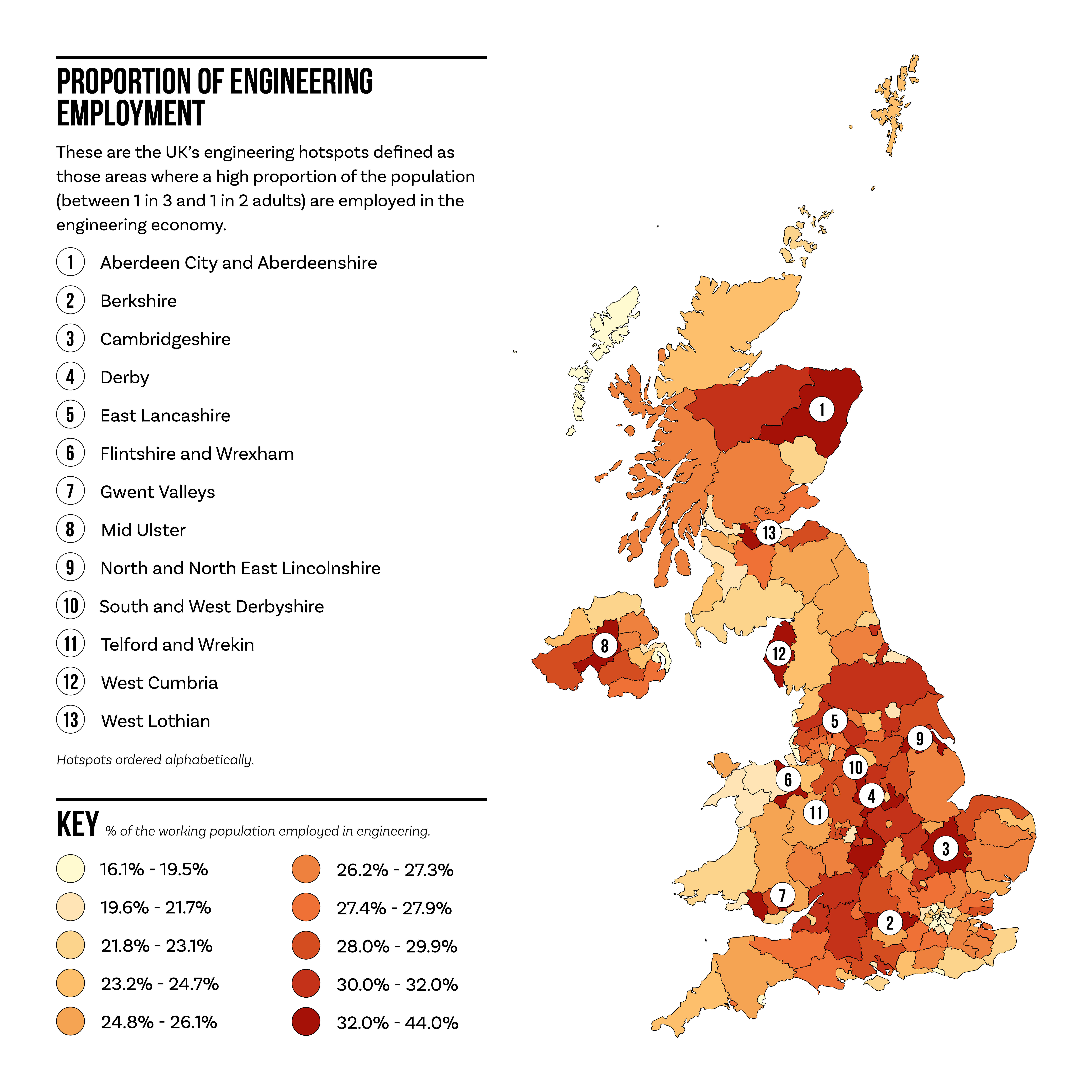New research reveals that the UK is an engineering powerhouse!
Research has revealed that the UK is an engineering powerhouse, with the profession generating up to an estimated £645bn gross value added (GVA) to the UK’s economy annually – equivalent to 32% of the country’s economic output.
The research has been released by the Royal Academy of Engineering on National Engineering Day, which aims to celebrate UK engineering and highlight the importance of the profession and its impact on people’s lives.
The research, conducted by Metro Dynamics for a project commissioned by the Royal Academy of Engineering, also reveals:
- Hotspots of engineering appear all over the UK, not just in major cities: Mid Ulster, West Cumbria, Flintshire and Wrexham, West Lothian, and Aberdeen and Aberdeenshire are the areas where the highest proportion of the local population is employed in engineering
- More than 8.1 million people – or over a quarter of all UK workers (26%) – are part of the nation’s engineering economy
- The UK has 729,000 engineering businesses – equivalent to more than one in 10 (13%) of all UK businesses
- On average, the annual economic output generated from an engineering job is estimated to be 23% higher than the average job in the UK
Dr Hayaatun Sillem CBE, CEO of the Royal Academy of Engineering, comments: “Engineering touches our lives every single day – even if we often don’t notice it. Listening to music on your phone or digital radio, flicking on the kettle for a cup of tea, or making a slice of toast are only possible thanks to the work of engineers. And they’re also improving lives at a global scale: engineers made it possible to manufacture and distribute Covid-19 vaccines to people around the world and are playing a major role in enabling progress towards net zero.
“On National Engineering Day, we want to celebrate the UK’s engineers and showcase how they are improving our lives for the better. This new research emphasises the economic impact of the sector right across the UK, revealing how important engineering is for employment and prosperity in a wide range of regions. Through their work in these regions, these engineers will also be improving healthcare, providing secure and sustainable energy, and contributing towards a sustainable and equitable future for people across the UK and beyond. Put simply, they are playing a vital role in tackling the problems we face today and improving our lives for tomorrow. However, if the profession is to continue to drive change, we need more people from a wider range of backgrounds to choose engineering. Through National Engineering Day we hope to inspire the next generation of engineers to join this future-shaping profession.”
The research has uncovered 13 engineering hotspots across the country, regions where a high proportion of the population – between one-in-three and one-in-two adults – are employed in the engineering economy. Hotspots include:
- Mid Ulster
- West Cumbria
- Flintshire and Wrexham
- Aberdeenshire
- Derby
- East Lancashire
The Academy has created a map of these hotspots across the country – with the darker shade of red indicating areas that have the highest concentration of people working in the engineering economy, with the yellow indicating lower areas of concentration.
 Credit: Royal Academy of Engineering
Credit: Royal Academy of Engineering
Engineering is driving local economies nationwide
The research also demonstrates that engineering is driving economic value across the UK. Areas benefitting economically from engineering include:
- Aberdeenshire: engineering generates more than £6bn (£6,565,044,338) GVA annually for the region. Over 100,000 people (101,583) are employed within the sector and there are over 8,000 engineering businesses (8,320) in the historic county.
- Glasgow: engineering contributes more than £6bn (£6,078,961,808) each year to the local economy and provides employment for just under 100,000 people (96,767). Scotland’s port city also plays host to just under 5,000 engineering businesses (4,735).
- Edinburgh: with an engineering workforce of almost 74,000 (73,419) and almost 5,000 (4,995) engineering businesses, Scotland’s capital city benefits from more than £5bn (£5,795,771,141) in GVA from engineering each year.
- London: engineering generates more than £126bn GVA for the capital annually. The city has over 132,000 engineering businesses (132,305) and employs more than one million people in engineering jobs (1,079,348)
- Birmingham: the profession generates more than £8bn (£8,151,415,612) GVA for the city annually. Birmingham’s engineering economy boasts over 8,500 engineering businesses (8,505) and over 113,000 employees in engineering jobs (113,585).
- Yorkshire and the Humber: engineering generates more than £44bn GVA (£44,522,727,252) for the region annually, employing just over half a million people (502,145) across almost 49,000 engineering businesses (48,840). Over 166,000 of the region’s engineers (166,683) are employed in other industries.
- Berkshire: the county’s engineering economy includes almost 16,000 engineering businesses (15,715) and over 177,000 people in engineering jobs (177,387), generating more than £19bn of GVA (£19,245,253,074) annually.
- Hertfordshire: the county’s engineering economy generates more than £14.5bn in GVA (£14,527,665,719) annually from 18,700 engineering businesses and just over 178,000 people working in engineering jobs (178,117).
- Oxfordshire: engineering generates more than £8bn GVA (£8,035,533,166) annually for the county, employing just over 87,000 people (87,330) across more than 8,700 engineering businesses (8,740). Plus, just over 23,700 engineers are employed in other sectors (23,710).
- Cambridgeshire: the county’s engineering economy generates more than £7bn GVA (£7,982,443,992) annually from over 9,000 engineering businesses (9,245) and more than 122,000 people in engineering roles (122,594).
The research is part of a wider piece of work, “Engineering, Economy & Place,” due to be published later this year by the Royal Academy of Engineering and Metro Dynamics.










